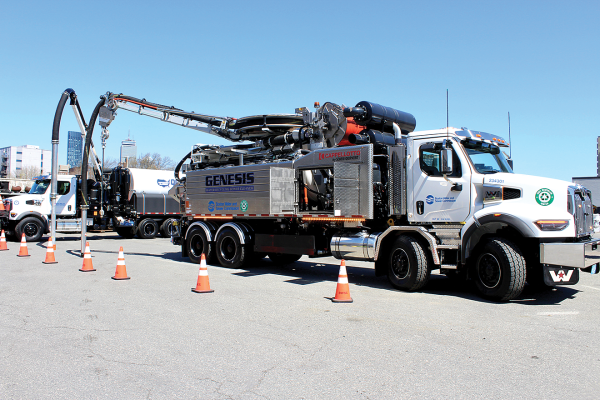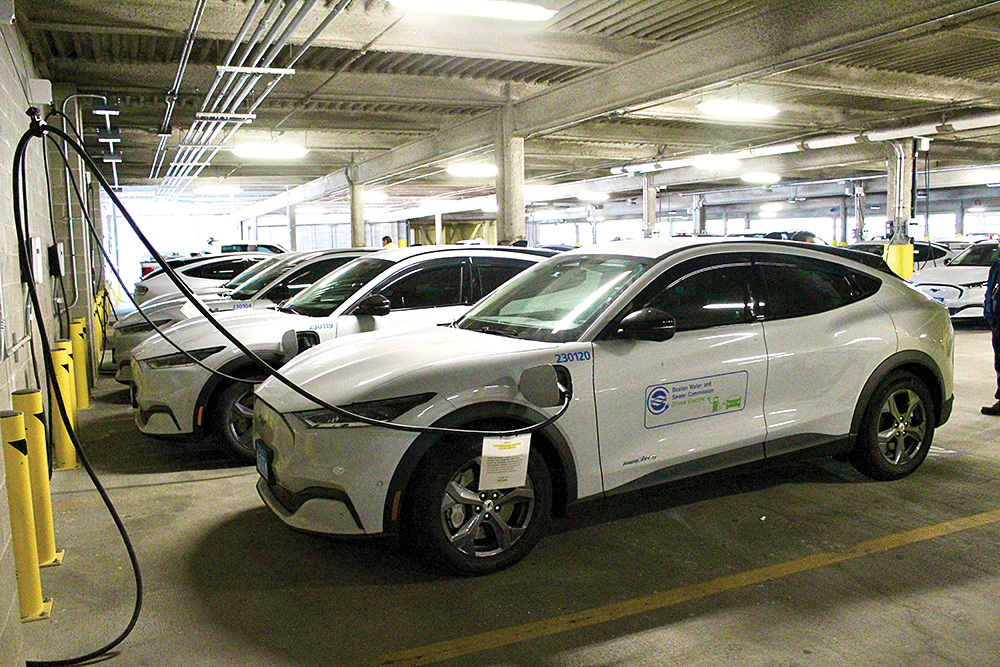April 24, 2024

The Genesis, a specialized truck acquired by the Boston Water and Sewer Commission, will help clean the city’s sewer and storm drains while saving water and money, according to agency officials.
The Boston Water and Sewer Commission on Monday unveiled a fleet of 37 environmentally friendly electric vehicles and a state-of-the-art sewer system cleaner at an Earth Day-themed event at their headquarters in Roxbury.
“Our goal is to make sure all the residents and businesses in Boston get nice clean water, no issues,” said Dolores Randolph, BWSC’s director of communications. “We have a crew 24/7 to make sure that happens.”
The 37 electric vehicles and the sewer system cleaner, called the Genesis, will make the agency’s work more environmentally friendly, Randolph said.
Stephen Mulloney, a spokesman for the pseudo-public agency that was established in 1977, said the new fleet is already in service.
“We have a thousand daily tasks of all kinds, from emergency repairs to an endorsement team that goes out and enforces our environmental laws,” said Mulloney. “It’s exciting that 37 are now electric. The chargers are also quite compact and it’s a good footprint for our garage.”
Sixteen of the new vehicles are Ford F-150 Pickup Trucks and 21 are Ford Mach-E Hatchbacks. The vehicles are powered in the BWSC garage by 40 chargers, including two fast chargers, resulting in an average of 1,485 gallons of unleaded gas and $4,800 saved per month.

Part of the BWSC’s new fleet of electric vehicles get charged up at a Roxbury garage.
Cassidy McNeeley photos
Peter Hunt, the agency’s chief information officer, explained that electrically charged vehicles don’t just save money but also directly contribute to the planet’s health.
“A lot of the savings aren’t just financial; its environmental cost,” said Hunt.
The Genesis is a specialized truck that uses pressurized water and suction power to clear blockages and pipes. It’s the first of its kind in Boston and will help clean approximately 1,538 linear miles in the city’s collection system while saving water and ratepayer dollars. This includes 710 miles of sanitary sewer, 670 miles of storm drain, 155 miles of combined sewer, and 3 miles of combined sewer overflow pipe.
Sekou Brown, the superintendent of Boston Water and Sewer, was excited to demonstrate how the Genesis truck works. While the older trucks got the job done, the task was much more complex and used around 60 to 80 gallons of water a minute.
Instead, the Genesis claims the preexisting water in the sewer and then uses it to clean the system. This means that, unlike older vehicles, the Genesis does not have to leave the work site to refill its water supply.
Not only does this feature save water but being able to keep the truck on site throughout the job directly reduces carbon emissions.
“Recycling is the name of the game with this machine. We don’t have to hook up to the hydrant, we don’t have to go back and forth,” said Brown.
The Genesis will use 90 gallons of water a minute, all of which will be recycled and reused. This improvement will save 96,000 gallons of water a week and almost five million gallons a year valued at around $100,000.
Like other sewer cleaners, the main goal of the Genesis will be to prevent sanitary sewer overflows (SSOs), which can be hazardous to people’s health and the environment.
“We can get anywhere in Boston that we need to,” the superintendent said about the truck, which also has 4 axles and weighs approximately 86,000 pounds. “You give me your street name and I’ll come to you.”
Part of what makes the truck accessible to all areas, including narrow Dorchester streets, is the remote-control system.
“The operator could be standing where you are and operating every system on the truck,” explained Brown. This also keeps BWSC employees safe when on the job, he said.
Industry experts predict that with its unique features then Genesis will be a game-changer in the water and sewer world. BWSC members hope to see more vehicles like this introduced to the city in years to come.


